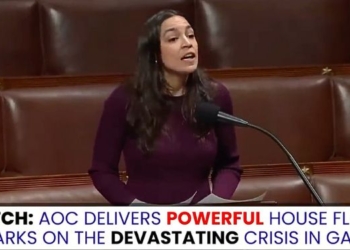
By Dr. Roger Waldinger, , | Common Dreams
President Trump’s latest compromise deal to end the government shutdown comes with strings—strict new anti-immigration rules on asylum, Deferred Action for Childhood Arrival (DACA), and Temporary Protected Status (TPS). All children from the Honduras, Guatemala, and El Salvador would be automatically rejected from asylum. Current DACA and TPS recipients would have to reapply rather than renew their membership. TPS recipients would have to meet an income and nationality test.
These proposals would leave many people with established lives in the U.S. in legal limbo. As Democrats and moderate Republicans negotiate with the President, and some Democrats break ranks, they should consider the long-lasting consequences of any deal. Lives hang in the balance now – yes – but also, pressingly, for generations to come.
Encouraging immigrants to become citizens is an American tradition, one so old that it goes back to the earliest moments of U.S. history. For the signers of the Declaration of Independence, “obstructing the Laws for the Naturalization of Foreigners” comprised one of the core grievances justifying the American colonists’ break with Britain.
The Trump administration appears eager to return to the bad practices that so angered the founders of our nation; in addition to its proposed legislative deal, it’s increasing bureaucratic obstacles, subjecting applications to greater scrutiny, and almost doubling the backlog in the process. But the current administration also misunderstands something critical about citizenship that the founders knew instinctively and that our research bears out: that citizenship is good for individuals and good for our country.
In making U.S. citizenship easily accessible, the founders had practical considerations in mind: They knew that the promise of naturalization would help attract the population required to fill up the new nation and the territory it claimed. But the founders also understood that they needed not just bodies, but new Americans, people who would identify with their country of adoption and transfer political loyalties from old to new home. Easy access to naturalization was therefore a long-term strategy to ensure greater equality of opportunity for newcomers as well to encourage them to become the full and active members on which democracy relies.
In our recently published book, Origins and Destinations: the Making of The Second Generation, we demonstrate the many ways in which citizenship acquisition has lasting impacts: affecting not just immigrants but also their adult children, and yielding benefits for those who naturalize as well as significant costs for those who never gain full-fledged American status. Thus while most politicians, the current administration included, think of naturalization and immigration policy as a lever to alter immigration today, our work finds that these decisions in fact have lasting effects over time and even across generations.
When we zoomed in on members of the “1.5 generation”—immigrant offspring born abroad but raised in the United States from a young age—we found that becoming an American citizen provided a leg up in the quest for educational success. Among the members of this 1.5 generation, those who had naturalized by the time they were interviewed enjoyed nearly an additional year of schooling over those who remained foreign nationals in adulthood.
Citizenship doesn’t just unlock the doors to social mobility; it also provides access to full participation in American life. In a democratic country like ours, anyone, regardless of citizenship, has the right to non-electoral engagement. They can write to an elected official, join a neighborhood association. But as we learned from our study of both American and foreign-born children of immigrants, growing up without U.S. citizenship depresses participation even in those forms of civic life.
Not only are non-citizens less likely to be civically engaged, so too are their peers who naturalized after the crucial socialization period of adolescence. Even looking at children who arrived in early childhood, these “late naturalizers” participated at lower levels than their U.S.-born counterparts, were less likely to identify with a political party, and were less likely to vote. Despite their standing as U.S. citizens on paper, they were still less likely to identify as Americans than those foreign-born, but U.S.-raised persons who had become U.S. citizens before the age of 16.
So it’s not only access to citizenship that matters; the timing of naturalization also counts – for the 1.5 generation, the earlier U.S. citizenship is acquired, the greater its impact. But children can’t become U.S. citizens on their own; when acquired during childhood, citizenship results from parents’ naturalization. And since naturalization isn’t easy but actually takes a lot of work (and costs a lot of money), adult immigrants are most likely to opt for citizenship when they see the people around them – in particular, their relatives – making the effort. Indeed, for the 1.5 generation persons whom we studied, the single strongest influence on their naturalization came from their parents’ decision to become U.S. citizens.
Naturalization isn’t just a family affair; it’s tied to broader currents in the ethnic community to which immigrants belong. The sum of the individual decisions to gain U.S. citizenship yields aggregate effects by creating immigrant communities characterized by greater civic engagement, political knowledge and an electoral voice. Yet because U.S. policy affects immigrant groups differently – with some finding ample opportunities to immigrate legally and others far more likely to enter without authorization – the presence of newcomers legally eligible to naturalize varies greatly from one group to the other, generating impacts for the economic well-being of the immigrants’ offspring, regardless of their place of birth. Children of immigrants from origin groups where new arrivals were more likely to enter the U.S. with authorization are better able to translate their educational credentials into good jobs. Even when we compared the children of immigrants with the same educational attainment, coming from similar types of families, who shared a similar legal status, we found that belonging to an immigrant community that experienced an easier pathway to citizenship resulted in greater economic returns to educational investments than for those who belong to immigrant communities who lacked this accelerated access.
In impeding naturalization, the Trump administration is forsaking long-term benefits for arguable short-term gains, and policymakers shouldn’t play along. As our work shows, the United States would do better if it kept with the American tradition of naturalization, one that imposes simple residency requirements and an American history test, and one that celebrates the acquisition of citizenship as both an achievement and a contribution to a better America. Some of these problems predate Trump. Naturalization has been growing increasingly expensive, from an initial fee set at $60 in 1989 to $725 today – and that does not include the cost of legal advice to navigate the process. Even so, the naturalization system had by and large been doing its work, bringing long-time residents into the fold, rather than stranding them as perpetual foreigners.
Our evidence is clear: Immigrants’ formal entry into the nation yields positive results over the long term for immigrant populations. From there, we know that the higher educational attainment, economic attainment, and civic engagement of naturalized immigrants and their descendants creates positive spill-overs for all. A more highly educated and higher-achieving population makes for a stronger, more innovative economy. Stronger civic engagement creates social capital that helps local communities to thrive. And as shown by the record number of first- and second-generation Americans voted into office in the midterm elections, the newcomers and their descendants are invigorating civic life. In the end, an America that keeps the doors to citizenship open is better for new Americans, old Americans, and Americans still to come.
This work is licensed under a Creative Commons Attribution-Share Alike 3.0 License








![WARNING: A Possible Bioterrorism Attack on People Viewing the April 8 Eclipse in the US [Video]](https://consciouslifenews.com/wp-content/uploads/2024/04/biological-attack-during-eclipse-350x250.jpg)






